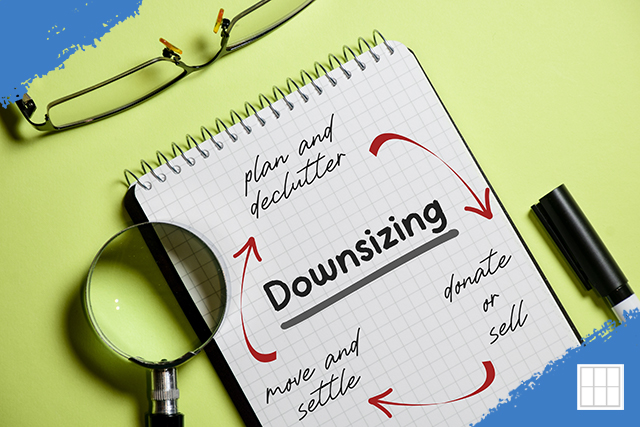When buying a home, one crucial step in the process is getting an appraisal report…

Downsizing Your Home: A Financial and Logistical Guide
Downsizing your home can be a transformative decision, especially for those looking to simplify their lifestyle, reduce living expenses, or prepare for a new stage in life. Whether you’re an empty nester, retiring, or just seeking a more manageable living space, downsizing offers both financial benefits and logistical challenges. This comprehensive guide will walk you through the essential strategies for transitioning from a larger home to a smaller one, ensuring you make informed decisions every step of the way.
Understanding the Why Behind Your Downsizing
Before diving into the logistics and financial aspects of downsizing, it’s crucial to clarify your motivations. Are you downsizing to save on utility costs and maintenance? Are you moving to be closer to family or for a new job? Understanding your reasons will help guide your decisions on the size and location of your new home, and it will keep you motivated throughout the process.
Financial Considerations
- Equity Optimization: If you’ve built up significant equity in your current home, selling it can provide a financial boost. This equity can be used to purchase your new home outright or to bolster your savings, reducing your monthly expenses significantly.
- Cost Analysis: Downsizing isn’t always synonymous with cheaper. It’s important to consider all costs involved, including moving expenses, potential renovations in the new home, and real estate fees. Make a detailed comparison of your current housing costs versus the expected costs in the new home to ensure downsizing makes financial sense.
- Tax Implications: Capital gains tax may apply if your home sale profits exceed the IRS exclusion limit. Consult with a tax advisor to understand the potential tax implications of selling your home and how to strategically plan for them.
Preparing to Sell Your Home
- Home Improvements: Small home improvements and repairs can significantly increase your home’s marketability and sale price before downsizing. Focus on cost-effective upgrades that offer a high return on investment, such as painting, fixing any cosmetic damages, and improving curb appeal.
- Staging Your Home: Professionally staging your home can make a big difference in how quickly it sells and for how much. Staging highlights your home’s strengths and gives potential buyers a vision of living there, which can be particularly important in a competitive market.
- Choosing the Right Real Estate Agent: An experienced agent can make the selling process smoother. Look for someone with a good track record in your area who understands the market dynamics and can provide valuable insights on pricing and marketing your property.
Finding the Right Smaller Home
- Location: Choose a location that aligns with your lifestyle needs—whether that’s being closer to family, enjoying urban conveniences, or relaxing in a quieter, suburban neighborhood.
- Functionality Over Size: Focus on how the space is used rather than the square footage. Look for a home with a well-designed layout that maximizes living space with storage solutions and multi-functional areas.
- Future-Proofing: Consider your long-term needs. A home that suits your lifestyle now and for years to come will provide the best value. Features like minimal stairs, accessible facilities, and low maintenance requirements can be advantageous as you age.
Managing the Move
- Decluttering: Downsizing your home is an excellent opportunity to declutter. Sort through your possessions and decide what to keep, sell, donate, or throw away. Focus on keeping items that are necessary or hold sentimental value.
- Storage Solutions: If there are items you can’t part with but won’t fit in your new home, consider storage solutions. However, be mindful of the ongoing costs associated with storage units.
- Timing Your Move: If possible, schedule the move during off-peak times to save on moving costs and avoid logistical headaches. Mid-week and mid-month tend to be less busy times for moving companies.
Adjusting to Your New Home
- Embrace the New Lifestyle: Take advantage of the benefits that come with downsizing, such as less cleaning and maintenance, potentially lower utility costs, and more time and funds for hobbies and travel.
- Community Engagement: Especially if you’re moving to a new area, engage with the community to make your transition smoother. Participate in local activities, join clubs, or volunteer to meet new people and establish a support network.
Conclusion
Downsizing your home can be a financially and emotionally rewarding decision, but it requires careful planning and consideration. By understanding your motivations, preparing financially, and planning the logistics meticulously, you can ensure a smooth transition to a more manageable home that better suits your current needs and future aspirations.

